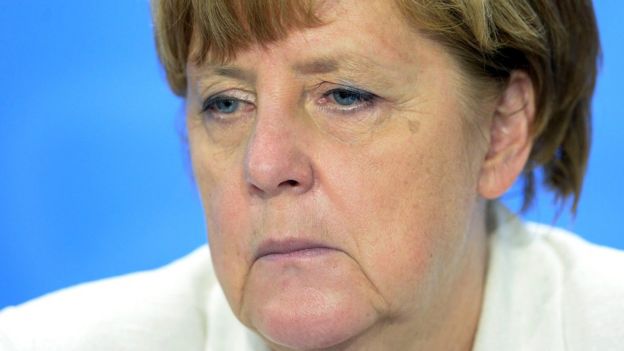
This article is more than
9 year oldIn the past, UK ministers would often coolly, condescendingly watch high drama here such as during the Greek euro crisis, or at the peak of the migrant crisis, observing - with raised eyebrow - the threats, tensions and expansive hand-waving amongst their EU colleagues.
But in the days and weeks since the Brexit vote the tables have been turned.
The rest of the EU has gazed open-mouthed at the apparent political chaos in Britain - and yes, we've been compared to Greece but without the glorious weather.
So when I'm now asked about the immediate European reaction to Theresa May being named Britain's next Prime Minister, I can only tell you that EU leaders have largely decided to watch, to wait and only then to react.
A high level source said to me on Monday evening: "We will react to Theresa May when she actually does something."
Mrs May insists she will honour the UK referendum result - Brexit it is - but today Germany's Angela Merkel urged Britain to move quickly to explain how it sees its future relationship with the EU.
She and other EU leaders want to know if Theresa May wants full or close access to the European Single Market, for example.

If so, they insist that would mean accepting the free movement of people - access to the UK labour market for all EU citizens.
That of course, would go against the wishes of a loud number of Brexiteers and Theresa May is already seen in Brussels as something of an immigration hardliner from her many meetings here as British home secretary.
But EU sources also describe her to me as a pragmatist as well as a hard negotiator.
The Italian paper Il Sole 24 Ore calls her Britain's answer to Germany's Angela Merkel: "cold, competent and determined".
Grudgingly, Brussels recognises that Theresa May (who is said always to have come to ministerial meetings here well-briefed) is unlikely to bow to EU pressure to start formal Brexit negotiations before holding extensive consultations.
They will take place at home, in Brussels with Britain's team of hugely experienced civil servants and with European counterparts across the continent - perhaps with a tour of European capitals.
The European Commission is not thrilled with the idea.
Its post-referendum message to the UK had been "No negotiation without notification (of the UK's formal intention to leave the EU)" but it realises it cannot do much to stop informal consultations.
Frustrated EU leaders take comfort from their conviction that once the formal Brexit process is finally underway, the EU - not the UK under Theresa May - will be in the driving seat.